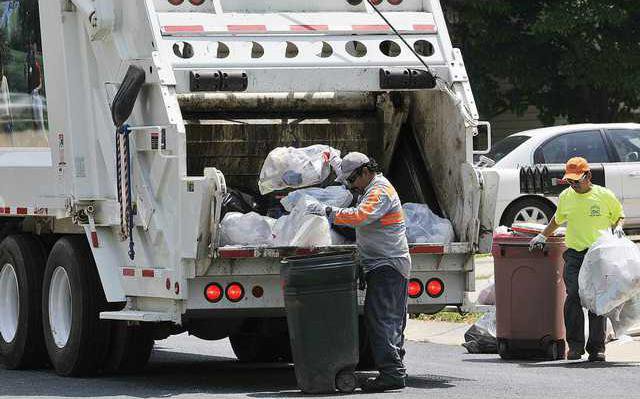A $2.20 increase in trash collection and recycling fees is imminent for Gainesville residents if the Gainesville City Council votes the same way today as it did two weeks ago, when four out of five council members voted in favor of the hike.
At that meeting, only Councilman Robert "Bob" Hamrick opposed higher trash fees, and other council members saw it as a way to make the city’s solid waste division less dependent on its biggest — and most strained — funding source, the general fund.
The City Council will vote a second time on the issue this morning, and if the rate hike receives final approval, Gainesville residents will start paying $17.20 each month for trash collection starting July 1.
The higher fee, if approved, will cut the city’s solid waste expenses by more than half and are partly a result of higher fuel costs and of increased landfill fees, which jumped from $34.50 per ton to $40 per ton this year, Gainesville City Manager Bryan Shuler said.
But Hamrick says higher fees are coming at a bad time: when residents in a city where 43 percent of households earn less than $40,000 are already facing hard economic times.
"Adding additional solid waste collection fees to (this portion of the population) of our community, in my opinion, would create additional stress in one of the most economically challenging times we have faced in recent years," Hamrick read from a prepared statement at the June 3 council meeting.
Without higher fees, however, other departments or agencies’ budgets would have to face more cuts, Shuler said.
"Without the fee increase, the budget would have to be amended in some way either by reductions or shifts ..." Shuler said at the June 3 meeting.
Four council members were not up to any more budget changes on June 3.
Before he voted in favor of the rate hike on June 3, Councilman George Wangemann said the higher fees will keep the solid waste division from relying too heavily on the general fund and allow residents to pay for the services they actually receive.
"I think this moves us along toward the goal that City Council once had: making the service itself stand on its own— self-supporting if you will," Wangemann said. "Basically, if you don’t do this, then that money has to come from the general fund, so (residents) can pay it in taxes or you pay it in fees."
Mayor Myrtle Figueras agreed, and said that the current budget had already faced too many cuts shortly before Councilman Danny Dunagan made a motion and all the council members — except Hamrick — voted to approve the higher fees.
And although other council members are not in favor of cutting other departments’ already trim budgets, Hamrick says further cuts might not hurt.
"I know they say you ought to make ... the user pay; well, we have other departments where we could use the same argument to say the user should pay, for instance in (Parks and Recreation)," Hamrick said.
Hamrick said raising the fees for non-Gainesville residents who use Gainesville’s Parks and Recreation facilities could keep the department, which is slated to receive a nearly $90,000 transfer from the general fund, from relying as much on the fund and leave more money to spend on city departments that only serve city residents.
Hamrick has similar feelings about the city’s funding of the Georgia Mountains Center and the Community Service Center. Both agencies are slated to receive more money from the general fund in the coming fiscal year than in years’ past to fund expanded services and renovations.
Hamrick says those are agencies where the user — whether it be a rider on Hall Area Transit or someone booking a meeting room at the convention center — should have to pay for service instead of the taxpayer, and if those agencies could increase their revenues, then they could decrease their reliance on the general fund.
Before raising fees, Hamrick said the city should audit all the commercial solid waste companies in the city to make sure they are paying what they should. He said the city’s income from Solid Waste franchise fees does not seem to have grown with Gainesville’s population, and perhaps there is more money the city should be collecting from commercial solid waste companies.
"Look at the ... commercial and industrial growth that we’ve had over the last, say, five, 10 years. It just seems to me like that we should be receiving a goodly portion of that," Hamrick said. "... And you could make some funds up that way, rather than charging the individual."
Shuler said the city does not usually conduct audits to make sure commercial solid waste franchises that operate in the city are paying what they should, but instead just makes sure all the companies operating in the city are registered.
Such an extensive audit would have to be an independent audit, Shuler said.
Also, Shuler says revenues from solid waste franchise fees have grown with the city. In fiscal year 2003, the city received a little more than $100,000 in solid waste franchise fees, and four years later, the city received nearly $30,000 more from solid waste companies operating in the city, Shuler said.
Shuler said he proposed raising the solid waste fee, because it was a step in reducing transfers from the general fund to other agencies. Since the vehicle-reliant Solid Waste division’s costs were rising, the fee increase seemed necessary to balance the city’s budget, Shuler said.
Still, Hamrick says he will "probably" vote against the increase at today’s meeting unless some of his suggestions for budget change are added.

